| Works of Annie Fields |
by
Annie Fields
1896
Part 6
February 10 - 15
Puerto Rico and the Dominican Republic
Page 68 continued
[ Monday 10 February ]
Monday 10th found us tired and sick at
Mayaguez on the island of Puerto Rico -- our first Spanish
colony. We went ashore to find a cool rather clean Spanish
Town, looking like a scene in a theatre. The houses are
not unlike in Pompeii,* it seems to us; brick or brick covered
with cement which is colored every gay color ^hue^
imaginable. The hills are very pretty behind the town and
we hear that there are some pretty houses also upon their sides;
they do not look volcanic like the mountains at Cape Haytien but
soft and with scattered foliage. At C.H. we saw the first
real volcanic peaks. We enjoyed this new glimpse of human
life. The naked Children, the powdered Spanish women, the
sweet fresh air, ^the shops where we found some pottery in
quaint style^ and came back somewhat invigorated to the
"Hermione" where we were still further restored by an excellent
dinner. In the evening the American consul came aboard
bringing his mother.* Such a yacht had never been seen in
these waters and the good woman who is a Parisienne but who
has been here for three years was eager for the little
pleasure of coming here -- so we showed them everything to their
vast entertainment and she told me in turn of the difficulty
they found in maintaining life here. The colored people do
not work -- there are only 200 whites and there is neither good
beef nor mutton nor vegetables{.}
Page 69
Of course this is a complaint which can be made of poor half settled places everywhere, and I offered her the poor consolation of suggesting that she should try to do as the natives do, live on their food, but prepared after the fashion she prefers. Also the conserving of June apples, etc. -- of which she seems never to have thought.* In spite of all she misses she has made herself a lovely rose-garden here which gives her great pleasure and she has dogs and cats and chickens and is evidently very busy among them all. As she spoke no English, the rest of the company was not much edified by the presence of the poor woman and they stayed until our host nearly dropped with fatigue. However we were stimulated to fresh conversational exertions continually by their evident enjoyment and when they dropped into their boat over the shipside with the dark we had a sense of having given a little pleasure to rather hungry fellow creatures.
Notes
Pompeii: Precisely what Fields means by comparing the houses of Mayagüez, Puerto Rico, to those of Pompeii in Italy is somewhat puzzling, as the houses of Pompeii could be seen mainly as ruins, excavated after being buried in ash in the eruption of Vesuvius in 79 A.D. She seems to refer mainly to their construction. Perhaps this particular association arises from her thinking about the volcanic mountains at Cape Haytien.
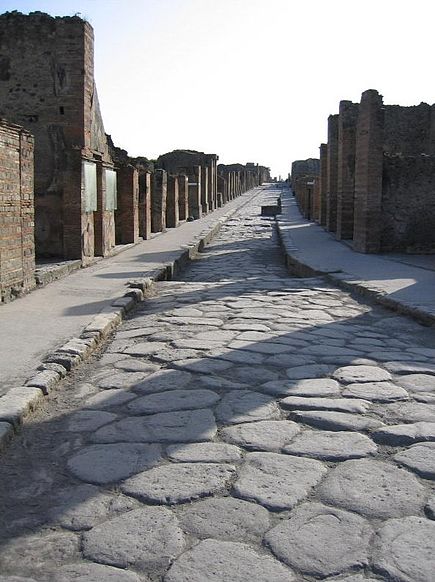
Image of Pompeii courtesy of Wikipedia.
American consul came aboard bringing his mother: The identity of the American consul at Mayagüez in 1896 has not been discovered. Assistance is welcome.
conserving of June apples: The term "June apples" usually refers to early season apples that flourish in temperate climates. However, there are some varieties of apples cultivated in tropical climates. Whether Fields's suggestion really is practical is unclear.
Tuesday 10th* A cool lovely day in the bay of Mayaguez. We thought of going ashore but the Captain who went early to market declared there was not a living thing of fresh interest beyond what we saw yesterday{.} Also a huge pelican has been fishing close beside us. The climate here is most lovely -- the skies are more or less clouded throwing shadows on the lovely hillsides and making the streets cool. For eight
Page 70
months in the year there is little change. often
there ^But^ in July, the rain descends and for three or
four months they must live in a hot steam. It is said, on
the whole, to be a most healthy climate which I can well believe
if one could get away from the months of rain. There
appears to be social life in Mayaguez. They have lately
introduced electric lights which make the little place look like
a beautiful [unrecognized word, Coronet ?]
resting on a mirror after nightfall{.} They also make
artificial ice.
Tuesday 11th [11 appears to be written
over 10] We steam away for San Juan our last
station before reaching St. Thomas where we expect to find some
letters.
Notes
10th: Fields has mistaken the date
for this entry. She apparently corrects this in her second
entry for the day.
electric lights: The Puerto
Rico
Electric Power Authority says that electric lighting was
introduced to the island in 1893.
artificial ice: Dr. John
Gorrie (1803 -1855) patented the first ice-making machine
in the United States in 1851. For a detailed history of
ice-making in the nineteenth century, see J. F. Nickerson, "The
Development of Refrigeration in the United States," especially,
pp. 170-1, in Ice
and
Refrigeration, Volume 49, Nickerson & Collins
Company, 1915.
San Juan: San Juan is the capital and the largest city in Puerto Rico. From Mayagüez to San Juan by sea is roughly 125 miles.
Wednesday Feb. 12. Our prospect changed suddenly.
The consul came on board to say that the whole island of Puerto
Rico was considered "an infected [port ?]" because of
one case of scarlet ^yellow^ fever on San Juan* and we
could not get a clean bill of health for St. Thomas but must go
into quarantine there for ten days! This news threw our
commander into a sad frame of mind; to be brought cheek by jowl
in narrow quarantine [ground ?] with other ships crowded
perhaps with sick persons and not to be able to move during that
time was not to be thought of for a moment. Every consul
on the island, as far as he could be reached was summoned to
advise us, either personally or by telegraph and the result was
Page 71
it was considered impossible to proceed. Then and there it was established that we must return. No want of spirit in ourselves was the cause; yellow fever quarantine was not to be encountered [partly written over some letters]. We had no very friendly feelings towards Mayaguez when we sailed away! We thought we might have been warned of this sad result of merely touching on the coast. The Dr. surely might have told us -- ! We held a long consultation among ourselves prescribing good cheer in spite of this last disappointment and turned the ship's prow soon after sunset back to San Domingo whose skirts we have been coasting as if she were a magnet we could not get away from. We had a horrid night of sea-sickness -- The severe rolling never giving over until noon Wedy when we suddenly found ourselves as Columbus did! Safe in this quietest of harbors [at ?] the city of Santo Domingo.*
As soon as the rolling stopped and we could look about us, we
saw the ship going up a beautiful ^noble^ river* with
the most beautiful views imaginable upon its banks; not as grand
say our travelled friends as Benares which it resembles, because
the river there is a mile and a half wide and here not half a
mile, but it has a beauty and a strangeness like no other and is
unsurpassed in historical interest.* The cathedral of
1510,* with its [unrecognized word, Marble ?],
and remains of Moorish titles and altars that are almost
Byzantine in their suggestions.
Page 72
Earthquakes seem to be have spared ^the city of^ San
Domingo {.} Therefore we still see the ruins of the palace
built by the son of Columbus, the fort said to have been built
by himself* and [deleted word] ^so [deleted word]^
of the earliest fortifications [written over other words].
It
is on the whole the most considerable place we have seen.
Grimke is our consul here and goes about with the party.*
Notes
The disease is caused by the yellow fever virus and is spread
by the bite of the female mosquito."
The one reported case of yellow
fever Fields refers to almost certainly was the death on 17
January 1896 of General Gami y Maladen, who was
governor-general of the province. John D. Hall, United
States Consul at San Juan, reported this death and added that
there had been several others in the city -- see Public
Health
Reports, Volume 11 (1897), Issues 1-52, p.
194. Fields and her party apparently feel they are being
treated unfairly and, for this reason, minimize the seriousness
of the outbreak. The rough fatality rate for the disease
is 15%. A few deaths indicates about 6-7 times more
infections, which may warrant imposing a quarantine.
Though experts were aware in 1896 that mosquitoes probably
carried the disease, it was not until 1900 that this knowledge
was fully established in the medical community.
It appears that the Hermione, by
leaving Puerto Rico and sailing to the Dominican Republic to
evade a quarantine at St. Thomas, risks spreading the fever,
though the disease was not unusual in the Dominican Republic.
city of Santo Domingo: Wikipedia
says: "Santo Domingo ... known officially as Santo Domingo de
Guzmán, is the capital and largest city in the Dominican
Republic and the largest city in the Caribbean by
population." From San Juan to Santo Domingo is about 250
miles.
^noble^ river: Wikipedia also says: "Founded by
Bartholomew Columbus in 1496, on the east bank of the Ozama
River and then moved by Nicolás de Ovando in 1502 to the west
bank of the river, the city is the oldest continuously inhabited
European settlement in the Americas, and was the first seat of
the Spanish colonial rule in the New World."
Aldrich published "Santo Domingo," his poem
about arriving at this port later in the year: The Century
Illustrated Monthly Magazine, 53 (November 1896), p.
32:
SANTO DOMINGO
AFTER long days of angry sea and sky,
The magic isle rose up from out the blue
Like a mirage, vague, dimly seen at first,
At first seen dimly through the mist, and then --
Groves of acacia; slender, leaning stems
Of palm-trees weighted with their starry fronds;
Airs that, at dawn, had from their slumber risen
In bowers of spices; between shelving banks,
A river through whose limpid crystal gleamed,
Four fathoms down, the silvery, rippled sand;
Upon the bluff a square red tower, and roofs
Of cocoa fiber lost among the boughs;
Hard by, a fort with crumbled parapet.
These took the fancy captive ere we reached
The longed-for shores; then swiftly in our thought
We left behind us the New World, and trod
The Old, and in a sudden vision saw
Columbus wandering from court to court,
A mendicant, with kingdoms in his hands.
Benares which it resembles: Benares
(Varanasi), India, stands at the mouth of the Ganges
River. The Aldriches had traveled in India in
1895. Thomas Aldrich summarizes this part of their
extended trip in a letter to his twin sons of February 8, 1895
(See Thomas
Bailey
Aldrich, pp. 186-7).
The cathedral of 1510: Wikipedia says that the Catedral
Santa
María La Menor was the first cathedral built in the
Americas, begun in 1512 and completed in 1540. It is not
clear why she dates the church to 1510. Also, the main
construction material of the exterior is limestone, rather than
marble.
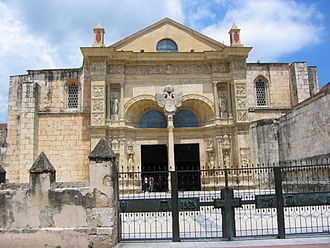
Catedral Santa María La Menor
Image courtesy of Wikipedia
ruins of the palace built by the son of Columbus, the fort
said to have been built by himself: Wikipedia says
"The Alcázar de Colón, or Columbus
Alcazar ... is the oldest Viceregal residence in America,
and forms part of the Colonial Zone of Santo Domingo World
Heritage Site. The building houses the Museo Alcázar de Diego
Colón... It was built under Diego Colón, the son of Christopher
Columbus; when he became Viceroy of La Española and the Indies
in 1509, he ordered the construction of a family home and
governor’s mansion between 1510 and 1512." When Fields saw
the building in 1896, it was a ruin, but it was restored in the
1950s.
Wikipedia says: "The
Fortaleza Ozama is a sixteenth-century castle built by the
Spanish at the entrance to Santo Domingo, Dominican Republic,
and overlooking the Ozama River. [It] is the oldest formal
military construction of European origin in America."
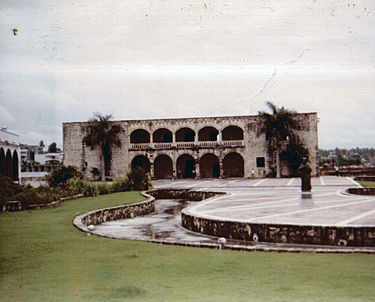
Alcázar de Colón -- after restoration
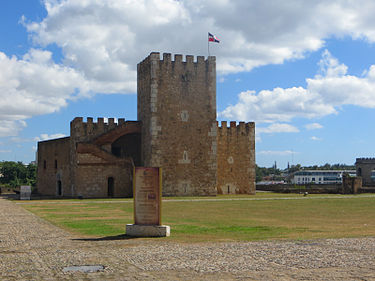
Fortaleza Ozama
Images courtesy of Wikipedia
Grimke is our consul here: In the second 13
February entry below, Fields reveals that the consul is a nephew
of the Grimké
sisters, Sarah (1792-1873) and Angelina (1805-1879).
Wikipedia says they "were 19th-century Southern American
writers, orators, educators, and Quakers who were the first
American women advocates of abolition and women's rights.
Throughout their lives, they traveled to the North, lecturing
about their firsthand experiences with slavery on their family's
plantation. Among the first American women to act publicly in
social reform movements, they were ridiculed for their
abolitionist activity."
Archibald
Henry
Grimké (1849 - 1930), according to Wikipedia, "was an
American lawyer, intellectual, journalist, diplomat and
community leader in the 19th and early 20th centuries. A
graduate of freedmen's schools, Lincoln University and Harvard
Law School, he later was appointed as American Consul to the
Dominican Republic from 1894 to 1898.... Grimké was born
into slavery near Charleston, South Carolina in 1849. He was the
eldest of three sons of Nancy Weston, an enslaved woman of
European and African descent, and her master Henry W. Grimké, a
widower. They lived in a common-law relationship, and Grimke
recognized his sons."
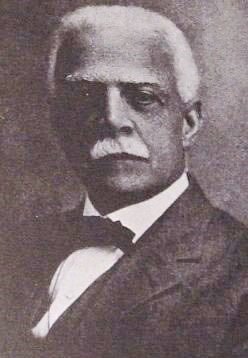
Archibald Henry Grimké
Image courtesy of Wikipedia
[ Thursday 13 February ]
Thursday Feb. 13th We were awakened
by the market cries close at hand on the river bank; the morning
making every ^thing^ beautiful once more. The Captain
passed my door bringing with him a red-snapper fish,* shining
with color -- silver and pink; the colored people in their
dug-outs (like giant wooden shoes) are moored at the bank
bringing sugar-cane, wood, tufts of green fodder and a little
fruit now a{nd} then -- to market. In exchange they seem
to bring bags of potatoes, or yams and demijohns or bottles
suggestive of native rum. I feel inwardly grateful that
the project of annexation was never carried out and rejoice that
Sumner carried the day;* -- a most difficult matter, standing
almost alone -- his foes being those of his own household.
Dr. Howe, A. D. White & Frederick Douglass being the
committee chosen by Grant to who reported against him --
not to speak of nearly every republican in the house. Our
party went ashore to be presented to the President (Hourau
^Heurepeux^ ˅called Houro ˅ seems like his name -- a negro
^brown man^, but a man of some power who has held his place for
15 years)* -- The seeing of Santo Domingo is a great
compensation to our disappointed party and every little corner
of the small place will be enjoyed before we leave{.}
Page 73
It is an endless shifting scene of interest put before one on the shore{.} The green tufts of fodder, chiefly it seems to me{,} the leaves of the sugar cane giving a fresh vivid green as inviting to my eyes as to the palate of the horses or cattle -- The sky is softly clouded -- the air cool and soft, and I could find it in my heart to regret not having gone ashore with the rest, if repose were not so dear to this stone-tired mariner!
When the party returned they gave a glowing
description of the reception at the palace of the
President. He is not an African. The people here
being descendants of the ancient race originally inhabiting this
island -- they were called the books say, Lucayans. He has
restored a square containing, when he took it the ruins of
Spanish buildings and has made an imposing home and garden --
the latter containing 200 [deleted word] dollars worth of
plants (hardly more than one hundred of our dollars by
the
way of our money) in order to bring variety and new beauty
into this climate where everything grows with so great
ease. There seems to be very little if any imported labor
here. So far as any labor is done the people do it.
His ^[Past ?]
Heurault's^ pastoral dignity and his manner of using our
language delighted the party. He was most courteous as
well as kind -- and accepted an invitation to dine the next day
upon the yacht, which was however deferred until Friday -- He
has evidently the true power of governing and devotes himself
body and soul to the development of his
Page 74
race. They brought flowers back to the ship and a sense of having visited a new world while seeing this man. They also saw the glass box containing the bones of Columbus.*
Notes
red-snapper fish: Wikipedia says: "The northern red snapper, Lutjanus campechanus, is a species of snapper native to the western Atlantic Ocean including the Gulf of Mexico, where it inhabits environments associated with reefs. This species is commercially important and is also sought-after as a game fish."
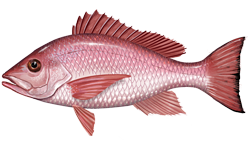
Image courtesy of Wikipedia
Sumner carried the day … Dr. Howe, A. D. White & Fred¬k Douglass ... Grant: Fields refers to President Ulysses S. Grant's failed attempt to annex the Dominican Republic in 1869, with the promise of eventual statehood. His stated purposes included securing an independent but weak nation from occupation by a European power. Senator Charles Sumner was among the leading opponents of the proposal, arguing that the treaty would have the effect of enriching American business at the expense of propping up a corrupt local government. Further, he feared that this was a preliminary to annexing neighboring Haiti, "a Black republic." Wikipedia says that after the initial failure of the treaty,"President Grant was able to get Congress to allow an investigation commission to be sent and make an objective assessment as to whether annexation would be beneficial to both the United States and the Dominican Republic. The Commission, sent in 1871, included [as secretary] civil rights activist Frederick Douglass and reported favorably on the annexation of the Dominican Republic to the United States. The Commission, however, failed to generate enough enthusiasm in the Senate to overcome opposition to Dominican Republic annexation. The whole affair never took into account the wishes of the Dominican people who desired to remain independent." See Dominican Republic: Report of the Commission of Inquiry to Santo Domingo by Benjamin Franklin Wade (President), Andrew Dickson White, Samuel Gridley Howe.
Heurepeux: Wikipedia says: "Ulises Hilarión Heureaux Leibert (1845 - 1899) was president of the Dominican Republic from 1 September 1882 to 1 September 1884, from 6 January to 27 February 1887 and again from 30 April 1889 until his assassination, maintaining power between his terms." The self he presents to the Hermione party proves questionable throughout their interactions. Though he claims primary descent from Lucayans, who inhabited the Bahamas when Europeans arrived, Wikipedia says that his ancestors are known to be of French and African slave ancestry. While it is possible that he believed that one or more of his ancestors were Lucayan, this has not yet been documented.
Of his government, Encyclopedia Britannica says:
Heureaux imposed order on the Dominican Republic by executing anyone who opposed him. Relative peace during his regime encouraged agriculture and trade and especially the growing of sugar, which became the country’s chief export. Under Heureaux, the economy improved, the infrastructure was modernized, and political order was established -- but at the price of dictatorship and corruption. His improvident dealings with the San Domingo Improvement Company of New York -- which floated loans, built railways, and took over the collection of customs -- left the country bankrupt and led to interference in the country’s affairs by the United States after Heureaux was assassinated by political enemies.See also Wikipedia, History of the Dominican Republic.
An interesting comparison with Fields's account of Heureaux is Frances L. Wills, "Heureaux and his Island Republic," in The National Magazine vol. 10, 1899, pp. 565-71. Wills characterizes Heureaux as a ruler who assumed absolute power: "Strong, handsome as a typical black man can be, without the ordinary vices of drinking and smoking; but preserving one or more seraglios in various parts of his little empire, ... ready to slay without mercy, and still, in a way, honest in his beliefs and generous to strangers...." (564). She says he often repeats his idea that "It is impossible to govern these people as you govern in the United States. The black man can only be ruled by fear and the half-breed is even more treacherous" (564). He was averse to foreign travel, saying, "Here I am general, president, everything -- in your New York or Boston I would only be a Negro" (565).
It seems clear that, while white observers see him as African of mixed ancestry and he acknowledges that this would be the case were he to visit the United States, still he presents himself to the Hermione party as significantly different from "the black man" and "the half-breed."
Fields's rendering of his name illustrates her somewhat frequent guessing about spellings of unfamiliar words.
restored a square: Among the significant 19th-century buildings in Santo Domingo is the "Residence of Ulysses Heureaux (Residencia de Ulises Heureaux). Located at 204 Las Mercedes Street. Modified Colonial. Lower doorways and windows of equal dimensions, descending to the floor. Vertical straight lines with rosettes in their centers. Simply framed upper doorways and windows. Continuous ironwork balconies on wood beams"; (the source of this quotation has been removed from the internet).
"San Nicolas de Bari Hospital (Hospital San Nicolás de Bari). Construction finished in 1522. The Dictator Ulysses Heureaux turned it into his private pasture. Corner of Hostos and Luperón Streets."
Heureaux's palace is now Casa de las Academias ... or Casa de Lilis at the Universidad Nacional Pedro Henríquez Ureña: "Seat of the Academies of History, the Language and the Medicine.... This house was constructed in 2 different centuries{;} thus the different styles. It was occupied by President Ulises Hereaux (Lilis). Later remodeled by Manuel Maria Gautier to add the balcony and the iron railings in the French tradition. It has also been the home of Receptoria de Aduana / customs receiving, Banco Central / Central bank, Logia Masónic/ a Masonic lodge among others."
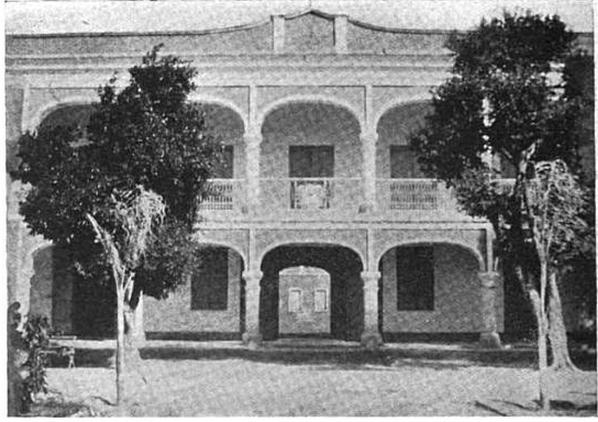
Heureaux's Residence
Image from Wills, p. 568.
the bones of Columbus: According to Bess Lovejoy's "The Scattered Bones of Columbus," in Lapham's Quarterly (October 15, 2013), the bones of Christopher Columbus were believed to have been discovered during renovation of the Santo Domingo cathedral in 1877.
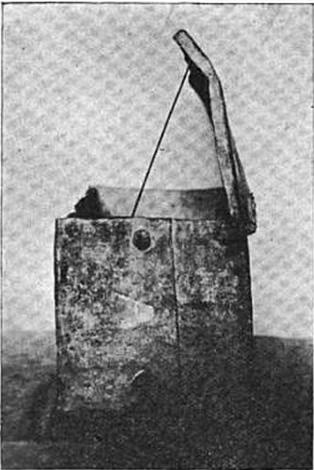
Casket in which Columbus's bones were thought to be found
Image from Frances Wills, p. 566.
[ Thursday 13 February 2nd entry for this day ]
Thursday Feb. 13. Took an exquisite drive through the
city out to a ruined fort and the bathing place [Guiba ?]
-- called [Wiva ?].* nothing could be
more picturesque -- the fort is nearly as old as the
earliest occupation by Columbus -- The waves were beating up
to its feet as it has been doing for centuries, but it is
now draped with [deleted letter] vines, and the
little "tourelles" are crumbling.* They were
sentry-boxes and Mr. Grimke our consul (the nephew of the
celebrated ladies connected with the Antislavery times who
came to New England to live)* said that one day returning to
one of these places and shutting himself in for a moment
after the gay party he was with, had departed, he discovered
a bit of candle laid up above the window which the last
sentry had put there. He carried it to a student of
archaeology who said the candle was at least two hundred
years old [written over another word]. On our
return we stopped at a little restaurant as we say, back a
little from the road under cocoa-palms and drank some
cocoa-nut water -- from the freshly gathered nut. It
was, to us, very pleasant and refreshing. A.F. &
S.O.J. Mr. Pardo, the German agent of the Clyde Line
of steamships* dined with us and told us of the bravery and
character of the President. He is endeavoring to
pass a law now by which the President ^he^ ^[ Two
unreadable words may be inserted below the line. ]^
may
Page 75
be re-elected as often as the people wish instead of going
out after a term of years as the plan is with us* -- He is
so important a person here where it is quite unlikely his
equal can be found to succeed him that the welfare of his
people appears to demand his continuance in office.
Mr. Pardo is one of the useful men of this world{,} knowing
his work and his place thoroughly. Mr. Pierce
expressed sincere admiration for him and said he had usually
found the German officials remarkably well fitted to be
useful in the situations they attempt to fil {fill}.
Unhappily we cannot say this always of our people.
Grimke does not speak the Spanish of the country although he
has been here 15 months.
Notes
ruined fort: Fortaleza Ozama in the old colonial
section of Santo Domingo. See photo above, which shows
the more recent restoration.
[Guiba ?] -- called [Wiva ?]: It seems likely that Fields is reporting what she heard rather than read about these locations. Playa de Guibia and Playa Viva Dominicus are beaches on the western side of Santo Domingo.
Mr. Grimke: Wikipedia
says
the Grimké
sisters, Sarah (1792-1873) and Angelina (1805-1879),
"were 19th-century Southern American writers, orators,
educators, and Quakers who were the first American women
advocates of abolition and women's rights. Throughout
their lives, they traveled to the North, lecturing about their
firsthand experiences with slavery on their family's
plantation. Among the first American women to act publicly in
social reform movements, they were ridiculed for their
abolitionist activity."
Archibald
Henry
Grimké (1849 - 1930), according to Wikipedia, "was an
American lawyer, intellectual, journalist, diplomat and
community leader in the 19th and early 20th centuries. A
graduate of freedmen's schools, Lincoln University and Harvard
Law School, he later was appointed as American Consul to the
Dominican Republic from 1894 to 1898.... Grimké was born
into slavery near Charleston, South Carolina in 1849. He was
the eldest of three sons of Nancy Weston, an enslaved woman of
European and African descent, and her master Henry W. Grimké,
a widower. They lived in a common-law relationship, and Grimke
recognized his sons."
See above notes for February 12.
Pardo : Fields's spelling of this name seems to vary between "Pardo" and "Prado." In 1903, a Mr. L. Pardo, German agent of the Clyde Steamship line in Santo Domingo, was involved in discussions about unloading the cargo of a Clyde steamship during an insurrection. See PapersRelating to the Foreign Relations of the United States (1904), p. 396 ff.
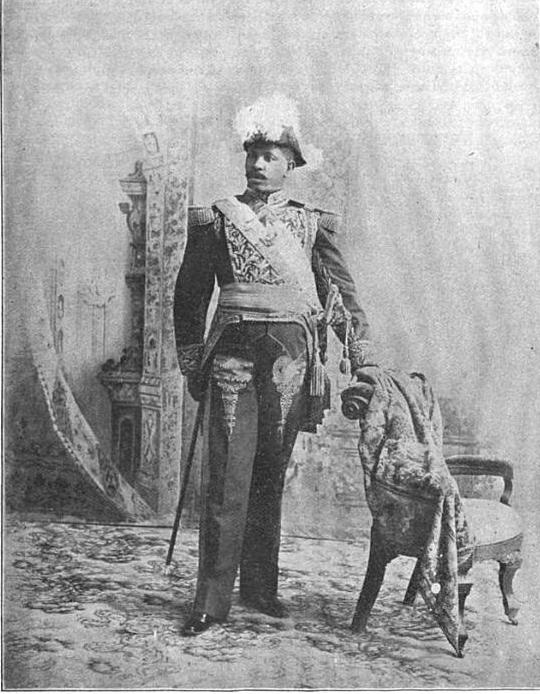
from Wills, p. 567
re-elected as often as the people wish:According to Encyclopedia Britannica (see above), Heureaux succeeded in making this change, which allowed him to rule without interruption until he was assassinated.At this time in the United States, a President could be reelected repeatedly, but none had yet served more than 2 successive 4-year terms.
[ Friday 14 February ]
Friday 14th St. Valentine's days! And we
did not know until night that the President was our
Valentine. We went shopping in the morning -- The
heat was great before we returned, but we bought Madras
handkerchiefs such as the women wear on their heads, to carry
home our other useful things.* In the afternoon, Mr.
Prado [ intended Pardo? ] accompanied us to the great
sugar factory.* It was very hot, and dusty with coal on
the Hermione and we were glad enough to be pushed off out
towards the sea to the point opposite the fortification whence
we could feel the refreshing air and could see the whole
city below and opposite. As we stood there a dark rider
came up the hill with Sword and Spurs and jumping from his
horse saluted us all in a charming manner and showed us over a
part of the establishment until meeting the engineer he
introduced him to us and vanished as suddenly as he
appeared.* He was a
Page 76
French officer who had been here only about two years but he
was very dark and might be now easily mistaken for a handsome
Lucayan. Returning to the ship we found everything in a
high state of preparation for receiving the President to
dinner. He was to come about six o'clock and the boat
was sent for him punctually. At the same moment our boat
touched the wharf we saw a stately figure accompanied by Mr.
Grimke* walking up the pier and another boat white full of
dark men draw up. It was the President's boat into which
he stepped and in a few moments was received at the Hermione,
first by Mr. Pierce and Mr. Aldrich at the land side
of the ship and afterward by the ladies in the forward
cabin. He was in full dress with a straw hat of finest
and most exquisite palm-leaf ^manilla or palmetto^
such as used to be considered the finest thing (they have
always been the most expensive) which gentlemen could wear in
the [summer ?].* His diamonds were magnificent
and his shirt embroidered. His manners a little stiff at
first, and I did not discovered until we came to the
table, that one arm was utterly disabled the elbow joint being
stiff.* Anything more interesting than his conversation
however would be impossible to find -- He ended just before we
left the table by speaking of Cuba. He is inclined to believe
that the day of Spain is over. The people are already
conquerors in the interior and are approaching Havana. Spain
will soon be compelled to retire to her coast defenses and she
is sure to be driven thence in two years or sooner.* Of course
if the [she has been changed to the] ^Cubans^ are
recognized
Page 77
by the great powers they will triumph all the sooner.
"Do these island republics take the part of Cuba?" some one asked.
"I will tell you a little tale of a camel,{"} he said, "if you will allow me -- a camel greatly overladen who lamented his sad fate. {'}I am bent to the earth,{'} he said, {'}everything is heaped upon me and I feel as if I could never rise again under such a load. {'} Upon his pack was seated a flea who heard the lament of the camel. Immediately the flea jumped to the ground. {'}See! {'} he said, {'}now rise, I have relieved you of my own weight. {'}" --
"Thank you, Mr. Elephant," said the camel, ^as he glanced at
the flea hopping away.^ The recognition of these islands would
help Cuba about as much," he answered ^added^
laughingly.
The President is a very abstemious man, eating little meat at any time and drinking no champagne, no coffee and using for himself no delicacies. His luxury is his garden of which he is fond and says he is his own gardener -- at least to the extent of cutting his own flowers when and how he wished, as our company discovered when they visited him. His house too was a pattern of cleanliness in strange contrast to everything else although San Domingo is certainly much cleaner than Port au Prince and quite different in the spirit of its people.
The President is the son of a Haytien soldier
Page 78
and he had seen wonderful changes he said even during his own
life. As a little boy at school they had only one lesson
book out of which the children copied what they had to learn
until his father bought another book for him for which he paid
four dollars. It would seem that his parents must have
owned some property because he spoke with great sorrow of the
man who had tried to make money out of his poor island, as
indeed from the moment of the Spanish occupation seems to have
{been?} the only idea of its governors. He
said when the day he took his seat as President they
were so poor that he was obliged to take fifty dollars from
his ^own^ pocket to buy pens, ink{,} paper books to make the
proper furnishing of the desk so that records could be
made. Also he has given a large tract of land on the
Samana bay to an American Fruit Coy for the cultivation
of the same including a plantation of 200,000 Bananas of his
own which they cultivate and send him the returns.
The wonder is as one talks with him, how this man has learned to be the finished gentleman, the scholar, the statesman, that he is, without ever having left his own soil. He has never seen any other place. "I might perhaps be somewhat discouraged he said, if I should see
your rich and beautiful land. as it is I do what I can to educate and develop my people{.}" I told him I had observed a carpenter's school for the children here -- Yes he said it is carried on, on the apprentice system and those boys are excused from serving in the army unless there should be some occasion for national defense. How many troops have you we asked. Five thousand he replied -- The Haytiens have have [repeated word] thirty thousand, -- but in the long future I trust by careful markings of our boundaries to settle all quarrels between us until eventually we may become one people and there will be no danger of wars between us." His English all this time was most carefully selected, his speech being rather slow but never dragging -- [deleted word] slow from the selection of phrases which was going on in his mind -- "I translate all the time I speak with you he said" of course he has few opportunities to speak English -- not enough to learn to think in it, as some Frenchman said was the test of knowing a language!
It appears that when he learns of any uprising or dissatisfaction at any quarter of the island that he goes to the place at once, learns
Page 80
the true cause of the [deleted word] trouble, nips it in the bud and thus far has always succeeded in preventing further [written over greater?] spread of it. He is indeed the government. There is a congress but one which works according to his suggestions Mr. Pardo said, in order to satisfy the people{,} if any serious questions come up he would send for five members to come to see him and would represent to them the point he wished to carry. If he succeeded in making sure that these men would vote on his side, he would then send for three others who were likely to be disaffected and feeling pretty sure of them the question could then be argued in Council and yet he would carry the vote.
After dinner he did not smoke but again examined parts of the yacht which interested him. He had never seen the electric fan before and probably many other things were new to him of which he did not speak. While he was taking this tour with Mr. Pierce, Mr. Aldrich took up his cane and discovered a long sharp sword in the sheath. It appears that he goes always heavily armed. Very soon after his return to us he took his leave. His black boatmen in a long boat covered with white sail inside upon which their bare feet rested -- the light high in the prow, the fine figure of the President, as he stepped into it and rowed away, has left a picture in our
Page 81
minds which will remain there. His grace,
including toasts at dinner, ^which took^ [taking ?]
the form of short addresses, was delightful{.}
the great sugar factory: Richard Haggerty describes the early development of the sugar industry in the Dominican Republic:
Columbus introduced sugarcane to Hispaniola, but sugar plantations did not flourish in the Dominican Republic until the 1870s, much later than on most Caribbean islands. Investment by United States sugar companies, such as the United States South Porto Rico Company and the Cuban-Dominican Sugar Company, rapidly transformed the Dominican economy. These companies had established themselves by the 1890s, and between 1896 and 1905 sugar output tripled. During the United States occupation (1916- 24), the sugar industry expanded further, acquiring control of major banking and transportation enterprises.
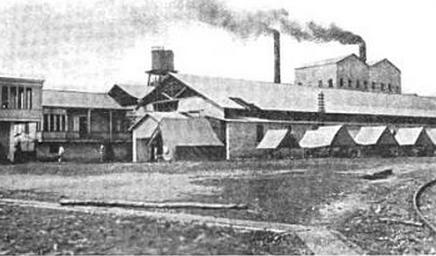
Sugar mill, possibly in Santo Domingo
Image from Shorey, p. 36
A. C. Shorey, "Resources of the Future in the Dominican Republic," p. 36 in The Americas, v. 3, National City Bank of New York (1916), indicates that in 1916, there were three major sugar operations with mills in Santo Domingo: Italia, San Isidro, and San Luis. The San Luis mill was on the west side of the Ozama, as was the Fortaleza Ozama, and therefore, not the mill the Hermione party visited at this time, though it may be the one they visited the next day. I have not been able to determine whether one of remaining two is the factory the party tours on 14 February. Ownership and names of sugar companies changed often before the turn of the century. Further information is welcome.
Sword and Spurs: Though it seems odd that the dark rider actually carries a sword, this is confirmed when either he appears again or his twin does in the February 15 entry. Capitalizing Sword and Spurs evokes the ceremony of investing a candidate for knighthood, which typically included presenting him spurs and sword. Fields implies, then, that the rider seems like a knight.
Mr. Grimke: See above, notes for 12 February.
straw hat: The hat probably is made from Manila hemp, which is also the color of manila envelopes.
one arm was utterly disabled the elbow joint being stiff: In Ulises Heureaux (1996), Fernand Lanore indicates that in his military career, Heureaux received a number of wounds, including one that disabled his right hand (p. 8).
The people are already conquerors in the interior and are approaching Havana: Heureaux's description of the Cuban situation is accurate, though his prophecy is not. Wikipedia says: "In a successful cavalry campaign .... the revolutionaries invaded every province [of Cuba]. Surrounding all larger cities and well-fortified towns, they arrived at the westernmost tip of the island on January 22, 1896...."
camel and the flea: The President offers a revised version of the Aesopian fable of "The Camel and the Flea":
A Flea, chancing to sit on the back of a Camel who was going along weighed down with heavy burdens, was quite delighted with himself, as he appeared to be so much higher. After they had made a long journey, they came together in the evening to the stable. The Flea immediately exclaimed, skipping lightly to the ground: " See, I have got down directly, that I may not weary you any longer, so galled as you are." The Camel replied: " I thank you; but neither when you were on me did I find myself oppressed by your weight, nor do I feel myself at all lightened now you have dismounted."From Terence. The Comedies of Terence and the Fables of Phaedrus. 1887. Reprint. London: Forgotten Books, 2013. 469-70.
He who, while he is of no standing, boasts to be of a lofty one, falls under contempt when he comes to be known.
son of a Haytien soldier: While the information about Heureaux in notes above confirms that his father was Haitian, it has not been confirmed that he was a soldier. Lanore says that little is known of his parents, of whom he was a "natural" child. Furthermore, during most of his childhood, he did not live with them (pp. 9-10).
a large tract of land: Samaná Bay, in the eastern Dominican Republic, is north of Santo Domingo. The Samaná Bay Fruit Company formed in the 1870s under the leadership of Julius H. Preston (1829-1899), who became its president, according to American Biography: A New Cyclopedia, Volume 10, edited by William Richard Cutter, (Section 29). Lanore says that Heureaux's banana concessions of 1896 to this company and to Romana Bay Fruit, like most of his business dealings, were means of funding his extravagant spending and helped bring about his assassination within a few years (pp. 49-50).
Sat. Feb. 15 -- before breakfast this morning two young messengers, colored of course, from the President, speaking English perfectly came on board bringing us gifts from their Chief -- One brought a live mongoose* in a cage and one a silver tray covered with the most magnificent flowers. I took the leaves and flowers out, almost one by one, to examine their strange and wonderful beauty, leaving on the centre of the table, for dinner, a sea of roses.
We went ashore later and bought Madras handkerchiefs ^again^ and saw the shops, and in the afternoon when it was cooler climbed the hill near by to see the sugar works.* We were glad enough to get out of the ship where they were coaling -- coal having been sold to us by the Clyde line of steamers under the auspices of two Jews for more than twice the price it costs at home. Our commander is not a mean man nor does he haggle at trifles, but he simply mentioned this as an instance of the injustice which men inflict upon others sometimes when they have them at disadvantage.
Page 82
We could not go without the coal and the Clyde Line of steamers had it to sell with the permission of the President upon which they threw the ordering of the transaction but Mr. Pierce was wise enough to see that it was extremely unlikely that the President had anything to do with the price of the coal. The disagreeable Jews who had the matter in hand were enough to account for the detail.*
On the hill of the sugar factory which was on one of the
outmost points of the harbor we could look across to the
opposite point where the old fort stands and see all the
vine-covered cliff-side with its most picturesque buildings
sloping down into the city. The air was cool and the
scene a lovely one. A French gentleman, dark now as the
native people showed us over the sugar factory. He was
in working costume with white jacket a{nd} trousers, sword and
spurs; but he was manly and interested us much -- soon
however he introduced us to the engineer and took his
leave. We should like to see him again; he seems like a
gentleman doing manfully a stiff bit of work laid out for him
here - /
Went to sea at night, coasting again toward westward;
a bad night; very heavy seas breaking over the vessel, but no
storm thank god! The seas were bad enough without
Page 83
the excitement of a storm. There was very little sleep and when a wave slopped down into our state-rooms we were rather uncomfortable as to our surroundings. The men in the fo'castle were wet through and some of them are sick in consequence with cold and fever beside sea-sickness.
Notes
mongoose: Wikipedia
says "Mongoose is the popular English name for 29 of 34
species in the 14 genera of the family Herpestidae,
which are small carnivores that are native to southern
Eurasia and mainland Africa." They are an introduced
species in the Caribbean. In a letter
of
February 18, Jewett says: "The President gave us
a mongoose in a cage at San Domingo & we had great fun
with it at first but it drooped under sea faring so today
the chief engineer & a 'boy' rowed ashore and let him
out. Bridget is quite bereft."
disagreeable Jews:
This incident is mysterious in several ways.
Was the price of coal artificially high in Santo Domingo in
February of 1896? Did the Hermione have to pay
more than the current local rate for its coal? To what
extent were the two "disagreeable Jews" responsible for the
price? Why does Pierce believe that, even though the
President exercises some control over the sale of coal, he
could not be responsible for what they are charged? As
they have an agent of the Clyde company at hand in Mr.
Pardo, why is he not part of this discussion?
The final question is not answerable, but
it sheds light upon the others, because the Hermione
party apparently did not pursue it, indicating that they
were satisfied with their own conclusion that the agreeable
President Heureaux hardly could have
allowed his guests to have to pay more than twice the
price they would be charged at home. Therefore, the
"disagreeable Jews" must be responsible for price-gouging.
Authoritative numbers are difficult to
obtain, but various sources available on-line provide some
reasonably reliable facts about coal transactions at the
turn of the 20th century.
- While the 320 ton Hermione's coal capacity is not known, a fair guess is that she could carry about 50 tons, based on the Sunbeam, a contemporary 532 ton yacht, which carried 80 tons of coal.
- Coal exported from the United States to the West Indies in 1896 earned the sellers about $3.50/ton.
- At about the same time, coal for home heating in New York sold at retail for about $4.50 / ton.
- Commercial Relations of the United States with Foreign Countries during the years 1896 and 1897 v. 1, p. 762, says that hard and soft coal imported to the Dominican Republic from England and the United States sold for $12-13 / ton.
- The Report of the Isthmian Canal Commission, 1899-1901, says that imported British coal was selling elsewhere in the world in the range of $5.83 to $6.85 / ton in 1900.
If these facts are accurate, it is clear that the price of
coal in the Dominican Republic was artificially high.
However, if it is literally the case that Pierce paid close to
twice as much in Santo Domingo than he paid at home in Boston,
his fuel would have cost him close to $9 / ton, which is less
than 75% of the local current rate of $12-13 / ton. If
he purchased a full 50 tons, he would pay $225 in New
York, up to $343 for English coal at other world ports,
$450 at twice the home price in
Santo Domingo, and $650 at the maximum price given in the Commercial
Relations document.
It seems reasonably likely that Pierce
and his party failed to understand the coal market in Santo
Domingo and that, in fact, they should have understood it
better. Clearly, it was a monopoly. Only the
Clyde shipping line was authorized to sell coal to retail
customers. Only the President had the authority to
establish and maintain this monopoly. Though Pierce
did not understand or appreciate the magnificent corruption
of the Heureaux
regime,
it should have been plain that the government's
arrangement with the Clyde line stood to benefit Heureaux and the company.
Assuming
that the "disagreeable Jews" were employees rather than
owners of the Clyde line, their personal benefit from
the transactions would likely be minimal.
Since Pardo was also a Clyde line
agent, he might well have been less than frank had he
been asked about the coal market, but he may also have
been able to point out what seems to be the case in this
transaction, which is that the President may have
personally approved a discount from the current
retail price for the party that had treated him so
graciously at dinner.
President Heureaux's charm seems
to have immunized Pierce
and
his party against the racial stereotypes that might
easily have led them to accept the coal
merchants' claims that the President was responsible for
the Clyde line taking advantage of their need to
purchase coal at this time. They could blame the
duplicity and greed of a typical American Black man who
has been "given an inch," or of the habitually corrupt
Black islanders, but instead they turn to the Shylock
stereotype of the Jew who enjoys exacting all that the
market will bear when given an advantage, even if this
brings him no personal gain. Fields, Jewett and Thomas
Bailey Aldrich were generally above this petty sort of
thinking, but during a tense time of their cruise and
when they believe they are being misused, the
anti-Semitic stereotype takes its bow.
Edited by Terry Heller, Coe College.
The original of this diary is in the collection of the Massachusetts Historical Society. My copy is from a microfilm, available courtesy of the University of Kansas Libraries, Lawrence Kansas: Annie Adams Fields Papers 1852-1912. Folio PS 1669.F5 Z462 1986, Reel 2.
| Works of Annie Fields |